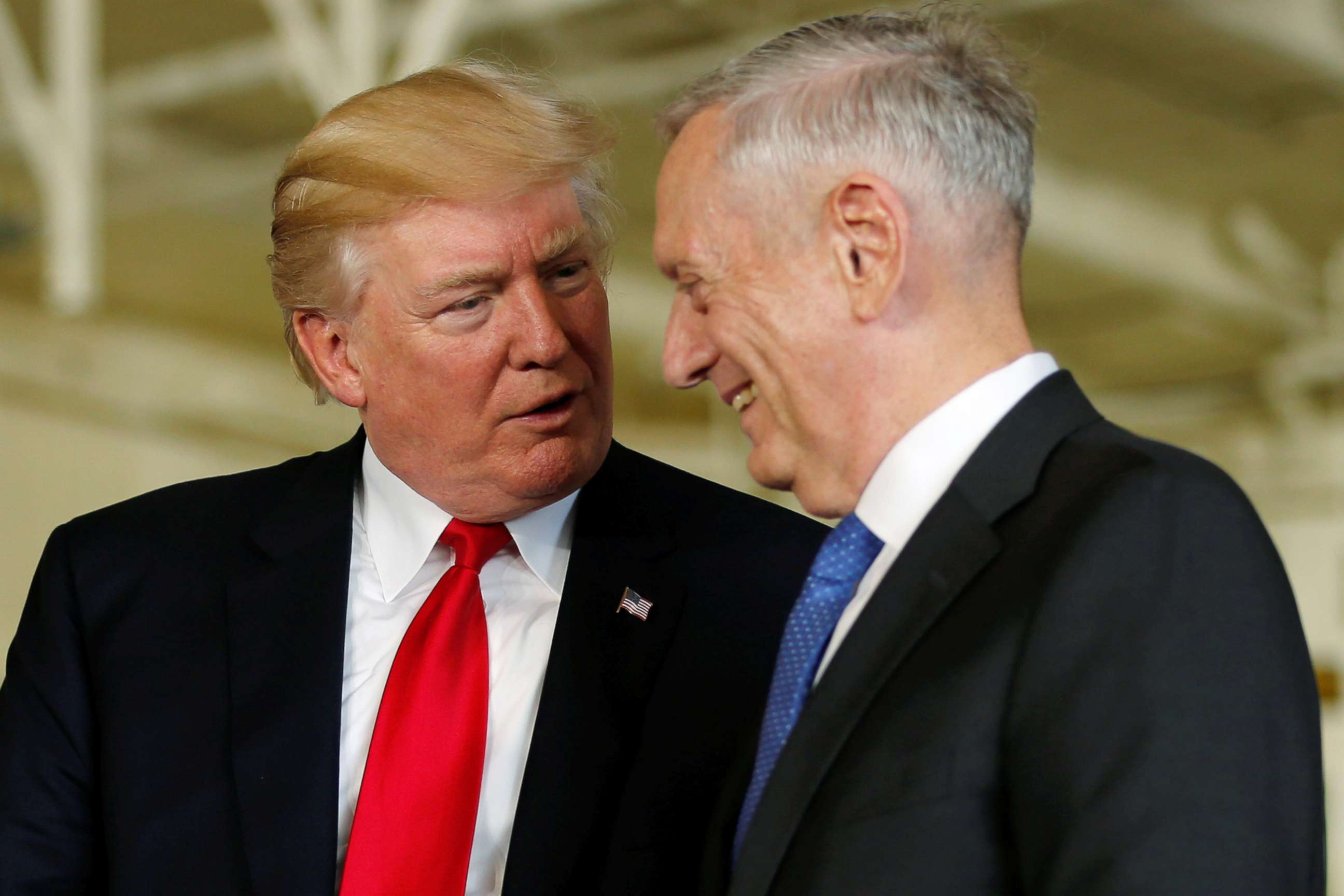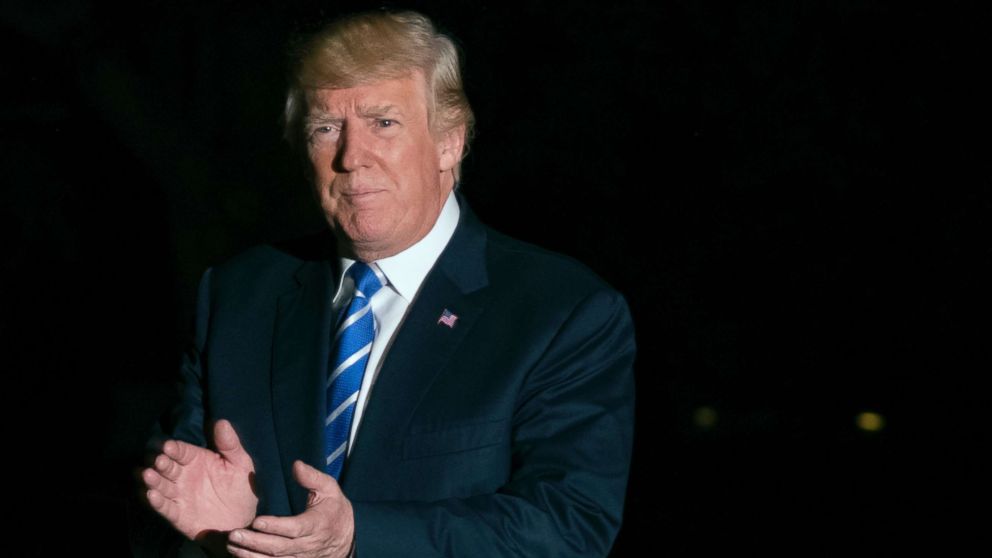What Trump has said about Afghanistan
— -- President Donald Trump's announcement tonight on U.S. strategy in Afghanistan may be at odds with prior positions he has taken on a conflict that has become the longest war in U.S. history.
Trump's exact plans have not been released ahead of his comments tonight, but some of his top advisers, including Secretary of Defense James Mattis, are known to favor an approach that involves keeping in line with current policy and adding more American troops on the ground.
Here's a review of what Trump has said about U.S. policy in Afghanistan in the past.
Before his presidential campaign
Trump was active on social media, particularly on Twitter, long before he ran for president.
He posted a number of tweets about the war in Afghanistan in 2011, 2012, and 2013, calling for the U.S. to end its involvement in the country.
In 2011, he suggested it was a matter of priorities, writing, "When will we stop wasting our money on rebuilding Afghanistan? We must rebuild our country first."
In 2012, he called the conflict a "total disaster" said, "we don't know what we are doing," and later criticized the Afghan forces.
"Afghanistan is a total disaster. We don't know what we are doing. They are, in addition to everything else, robbing us blind," he wrote in March 2012.
Five months later, Trump wrote, "Why are we continuing to train these Afghanis who then shoot our soldiers in the back? Afghanistan is a complete waste. Time to come home!"
The following year, he echoed his earlier sentiments.
"Let’s get out of Afghanistan. Our troops are being killed by the Afghanis we train and we waste billions there. Nonsense! Rebuild the USA," he wrote in January 2013.
Later that year, he appeared dismayed about the prospect of keeping 20,000 troops "there for many more years," adding the next day, "We have wasted an enormous amount of blood and treasure in Afghanistan."
"Do not allow our very stupid leaders to sign a deal that keeps us in Afghanistan through 2024-with all costs by U.S.A. MAKE AMERICA GREAT!" he wrote on Nov. 21, 2013.
In late 2014, Trump took issue with then-President Obama's decision to keep American soldiers on the ground in Afghanistan for another year. "He is losing two wars simultaneously," Trump wrote.
During the campaign
A number of articles were written during the presidential race about how Afghanistan policy was not addressed extensively by either of the eventual nominees. When Trump specifically was asked about Afghanistan, he typically responded in the context of his stance on the war in Iraq or used Afghanistan as a point of comparison to the "carnage" he saw in some American cities like Chicago.
One of the most controversial statements Trump made about Afghanistan came during an October 2015 interview with CNN.
"We made a terrible mistake getting involved there in the first place," he said on CNN's "New Day" on Oct. 6, 2015.
"At some point, are they going to be there for the next 200 years? At some point what's going on? It's going to be a long time," he said.
"We made a terrible mistake getting involved there in the first place. We had real brilliant thinkers that didn't know what the hell they were doing. And it's a mess. It's a mess. And at this point, you probably have to (stay) because that thing will collapse about two seconds after they leave. Just as I said that Iraq was going to collapse after we leave."
Later that same month, Trump said that he never said that the U.S. should not have gone into Afghanistan in the first place, asserting that he was talking about Iraq. Trump often claimed that he had always been against the invasion of Iraq, which is not supported by evidence.
When asked in a subsequent CNN interview about his calling the U.S. military effort in Afghanistan a mistake Trump said, "I never said that. OK, wouldn't matter, I never said it. Afghanistan is a different kettle. Afghanistan is next to Pakistan, it's an entry in. You have to be careful with the nuclear weapons. It's all about the nuclear weapons. By the way, without the nukes, it's a whole different ballgame," Trump said in the Oct. 20, 2015, interview with CNN.
"We made a mistake going into Iraq. I've never said we made a mistake going into Afghanistan," he said.
The presidential candidate maintained that explanation when asked during a March 3, 2016, Republican debate about a series of flip-flops he had made about Afghanistan.
"Well, on Afghanistan, I did mean Iraq. I think you have to stay in Afghanistan for awhile, because of the fact that you're right next to Pakistan, which has nuclear weapons, and we have to protect that. Nuclear weapons change the game," he told moderator Megyn Kelly.
As president
Just five days after taking office, Trump spoke to ABC News' David Muir at the White House and referenced Afghanistan. But he spoke about the South Asian country not in the context of his foreign policy plans, but in reference to problems in Chicago.
"It is carnage. It's horrible carnage. This is Afghanistan -- is not like what's happening in Chicago. People are being shot left and right," he said, referring back to a point in his inaugural speech when he talked about "American carnage."
Trump and his team have since been developing the administration's policy for Afghanistan.

Defense Secretary Mattis told Congress in June that he believed the administration would formulate its Afghanistan strategy by mid-July. But that deadline came and went because Trump's national security team debated whether the strategy should be broader in scope.
The plan for Afghanistan has evolved into what is now known as the South Asia strategy and includes regional considerations for neighboring countries like Pakistan, India, China and Russia.
Trump is said to have been dissatisfied with the original strategy review and the request for more American troops, which is one reason why his national security team has developed additional options.
Trump most recently met with his national security team on Aug. 18, 2017, and tweeted the following day that there were "many decisions made, including on Afghanistan."
ABC New's Luis Martinez and Alexander Mallin contributed to this report.




